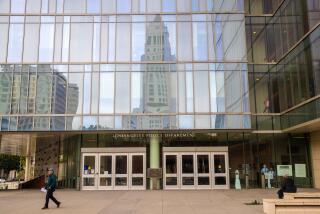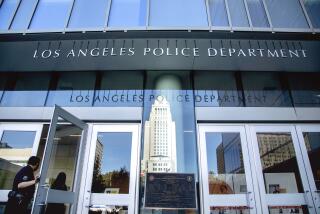Editorial: Reforming the police disciplinary system should be done in public view, not in backroom negotiations

The brutal beating of Rodney King by the Los Angeles police and the riots that followed were still fresh in voters’ minds when they went to the polls on June 2, 1992, and overwhelmingly endorsed a package of police accountability reforms.
One of the reforms made changes to the structure of the Board of Rights, the disciplinary panel created in the 1930s that makes the final determination about whether officers deserve to be fired. One of the more damning revelations by the Christopher Commission, which was formed in the wake of the King beating, was that the department was excessively lenient on officers accused of using excessive force.
Officers weren’t happy about the restructuring of the discipline panel, and particularly the requirement that one member of the three-member board be a civilian. Who knew how civilians would view police work or how harsh they would be in their judgments? The Los Angeles Police Protective League, the union that represents rank-and-file officers, actively campaigned against the change, spending hundreds of thousands of dollars to try to stop the reform package.
But all that worrying was for nothing, it seems. Twenty-four years later, it turns out that civilians are consistently more lenient to police officers facing dismissal than the two department representatives on the board, according to police officials.
Now, the union wants another update to the disciplinary board. This time, it would like the panels to be made up entirely of civilians, with no police members at all. Go figure.
The way the system now works is that the police chief recommends punishments for officers, but for recommendations harsher than 22 days of suspension, the request must go to the Board of Rights, which holds a hearing to review all the evidence and then rules on the case. Three Board of Rights members are chosen for each case -- two officers selected randomly from the ranks of department’s command staff and one civilian picked from a pool of people who apply and are selected by the Police Commission.
The union began meeting earlier this year with the mayor’s office to discuss changes. Its apparent concern is that officers cannot get a fair shake from the panel because two of the three members owe their positions and rank to the chief.
But the meetings with the mayor broke down in April, after what should have been obvious all along was acknowledged: that the police disciplinary process is detailed in the city charter and any change must be voted on by the public. Instead of going down that road, however, the police union decided to bypass the voters and go right to court. It filed a federal lawsuit in May charging that the LAPD’s disciplinary system is unconstitutional and deprives officers of due process because the chief has unfair influence over two of the three members of the Board of Rights.Though a judge will ultimately decide, the evidence so far doesn’t seem persuasive. For one thing, Board of Rights panels have opted to impose a lighter punishment in more than half of the 184 cases in which Chief Charlie Beck recommended dismissal over the last five years. To an outsider, that doesn’t look like a system that is secretly controlled by the chief.
As part of the case, the police union cites four previous lawsuits against the department in which high-ranking officers said they felt pressured to fire people while serving on the Board of Rights, or believed they were retaliated against later for not voting to fire an officer. But that’s hardly proof.
The timing of the lawsuit is also questionable. Although the ballot measure in 1992 changed its composition, the LAPD’s Board of Rights process has been in place for about 85 years. If it was inherently unconstitutional, why wouldn’t the union would have sued long ago? Frankly, this seems more like another broadside against Chief Beck by a union that has been extremely critical of him in recent months.
And even though the mayor has been open to discussing changes to the disciplinary system with the union, he hasn’t said that there’s anything substantially wrong with the system as it exists, only that it is old and “outdated.” Garcetti staffers have said the system might create a perception that the chief has undue influence.
It’s fine for the mayor to be responsive to police officers, who have an important and dangerous job protecting the city. But if there is a discussion to be had about reforming the disciplinary system it should be held in public, not in backroom negotiations.
Follow the Opinion section on Twitter @latimesopinion and Facebook
More to Read
A cure for the common opinion
Get thought-provoking perspectives with our weekly newsletter.
You may occasionally receive promotional content from the Los Angeles Times.






